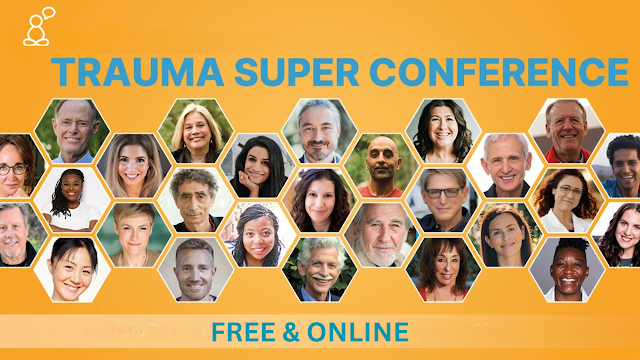⚠️ Important Disclaimer
The content on this website – including articles, event announcements, personal experiences, and recommendations – is for informational and educational purposes only and is not medical advice. Always consult a qualified healthcare professional before making any changes to your diet, exercise, supplements, sleep habits, or wellness routines, especially if you are pregnant, nursing, on medication, or have any medical condition.
The content on this website – including articles, event announcements, personal experiences, and recommendations – is for informational and educational purposes only and is not medical advice. Always consult a qualified healthcare professional before making any changes to your diet, exercise, supplements, sleep habits, or wellness routines, especially if you are pregnant, nursing, on medication, or have any medical condition.
Trauma Super Conference
Trauma can have a significant impact on a person's mental and physical health, affecting their ability to cope with stress, form relationships, and maintain a sense of safety.
The effects of trauma can vary depending on the individual and the nature of the experience. Some common symptoms of trauma include flashbacks, nightmares, hypervigilance, anxiety, depression, and difficulty concentrating. These symptoms can make it challenging to function in daily life and can lead to problems in work, school, and relationships.
To address the impact of trauma, Over 60+ top experts in trauma have come together at the "Trauma Super Conference", including functional medicine physicians, scientists, researchers, psychologists, and healers, to offer resources such as tools, techniques, and practices to help you become aware of your own trauma, understand its impact on your daily life, and start the healing process.
The effects of trauma can vary depending on the individual and the nature of the experience. Some common symptoms of trauma include flashbacks, nightmares, hypervigilance, anxiety, depression, and difficulty concentrating. These symptoms can make it challenging to function in daily life and can lead to problems in work, school, and relationships.
To address the impact of trauma, Over 60+ top experts in trauma have come together at the "Trauma Super Conference", including functional medicine physicians, scientists, researchers, psychologists, and healers, to offer resources such as tools, techniques, and practices to help you become aware of your own trauma, understand its impact on your daily life, and start the healing process.
They will delve into the various types of trauma and their effects, the latest research and treatment approaches, and the importance of trauma-informed care across different settings. Stay tuned for a deep dive into the world of trauma and its impact on individuals and society as a whole.
Exposure to trauma can have long-term effects on your health and well-being, with early life stress and unresolved emotional trauma being the most underexposed risk factors for chronic complex illness today.
An alarming 67% of adults report experiencing trauma, which leads to a significant increase in the risk of seven out of the top ten causes of death and reduces lifespan by 20 years.
Fortunately, the psychological, neurological, and biochemical impact of early life stress and trauma can be reversed, and we can heal.
Join the Trauma Super Conference to explore the impact of trauma, receive tools and strategies to support healing, and more.
The conference features renowned healers such as Dr. Peter Levine, Dr. Stephen Porges, Dr. Gabor Maté, Dr. Richard Schwartz, Dr. David Perlmutter, Dr. Bruce Lipton, Dr. Dawson Church, Judith Orloff, Dr. Diane Poole Heller, Dr. Pedram Shojai, Terry Real, and Fleet Maull.
The experts will cover various topics, including:
- the different types of trauma,
- understanding and healing relational trauma,
- the relationship between trauma, substance use, and addiction,
- stress and burnout as a symptom of trauma,
- grief and loss,
- creating secure attachment,
- adolescent mental health,
- nervous system regulation,
- inflammation resulting from trauma,
- holistic and homeopathic approaches,
- breathwork and somatic practices,
- inherited trauma,
- internal family systems therapy,
- emotional intelligence,
- codependency,
- trauma healing expectations,
- mindfulness,
- attachment styles,
- high sensitivity and empathy,
- anxiety, depression, and sleep issues.
In addition to these topics, the conference also offers yoga videos, guided meditations, and filmed therapy sessions to bring healing theories to life.
WATCH PROMO & REGISTER
CLICK PLAY BUTTON & WAIT FOR VIDEO TO FINISH
REGISTRATION LINK WILL APPEAR HERE.

.png)


.png)

.png)
